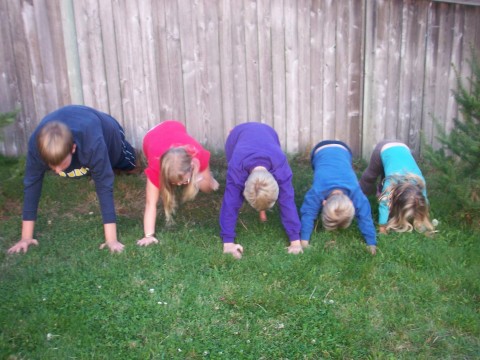 When I get home from work, I’m often tired and hungry. By the time we sit down for dinner, I’m frequently ravenous (unless I’ve already devoured everything in the fridge while waiting for dinner, in which case I’m stuffed). Either way, I don’t usually have a lot to offer in terms of deep and insightful spiritual teaching.
When I get home from work, I’m often tired and hungry. By the time we sit down for dinner, I’m frequently ravenous (unless I’ve already devoured everything in the fridge while waiting for dinner, in which case I’m stuffed). Either way, I don’t usually have a lot to offer in terms of deep and insightful spiritual teaching.
Our evening meal is generally a time to share news about the day, but sometimes this can turn into a blame-fest of epic proportions. As they report the events of the day, my children occasionally accuse one another (and sometimes, in their enthusiasm, they’ll accidentally implicate themselves) in various types of wrongdoing. Frankly, I’d rather not know about some of those things, and the bickering that ensues among the children can wear on the soul.

Much easier to curl up on the couch and hide from everyone as Joshua did this morning. He claims he was “sick” but I think he was trying to avoid work.
A few years ago I began the dinner-time practice of asking each of my children to tell us all about something for which they are thankful to God. This has a happy, dual effect: first, it produces silence, sometimes as much as ten seconds’ worth, while everyone thinks furiously over the day for the best event of the day (my children are competitive, even in thankfulness). Second, it focuses our minds on God’s gracious provision for our family, and pulls us out of the morass of blame and accusation. It is hard to be negative after the second or third round of blessings — and we’ll sometimes go around the table four or five times, if we get on a roll.
We ALWAYS enjoy a table set with crystal and china. That’s just who we are. ![]() Right.
Right.
Recently, we’ve been struggling with a higher level of sibling rivalry than we’ve seen before. I decided to change our meal time conversation a little, and I asked, “What is one positive thing you can say about your brother or sister?” There was a stunned silence.
The absence of chatter stretched ominously. I ruled out a few half-hearted attempts that had to do with a sibling’s possessions or were, under the covers, insulting.
“I like my brother’s cool toy!”
“I like it when my sister isn’t so annoying.”
“I really enjoy my brother’s friends!”
The silence persisted. My children found great difficulty in thinking of praiseworthy attributes in their siblings; upon reflection, I felt convicted that my own stinginess with praise had left its mark on my family.
Hear, O Israel: The LORD our God, the LORD is one. Love the LORD your God with all your heart and with all your soul and with all your strength. These commandments that I give you today are to be upon your hearts. Impress them on your children. Talk about them when you sit at home and when you walk along the road, when you lie down and when you get up. Tie them as symbols on your hands and bind them on your foreheads. Write them on the doorframes of your houses and on your gates. Deuteronomy 6:4-9
As much as we enjoy watching a movie over dinner, or even just sitting around recounting the events of the day, a meal together is not to be scorned as an opportunity to instruct your children in godliness. A couple of times, recently, I’ve asked a few open-ended questions that have provoked some really interesting discussions.
When all else fails, pull out the laptops and bond over computer time.
Mealtimes are also great because they provide some natural protection from being found out as a know-nothing parent. Sooner or later, the kids will come up with something you can’t answer; if this occurred in a normal conversation, you’d have to sit there like a deer in the headlights, mouth gaping helplessly. But at mealtime, you can spend quite a bit of time thoughtfully cutting your meat, pretending to chew, adding condiments, etc., while you think furiously.
Child: “So, Dad, why does God allow suffering?”
Dad (quickly stuffing a forkful of meat in his mouth): “Er, mumph, rumph, umph.” (Waves graciously for his wife to take a stab at answering the question.)
Mom (smiling, voice syrupy-sweet): No, you can answer that one, dear, as soon as you’ve finished chewing.
Most children will lose interest after twenty or thirty minutes of chewing.
Tim
Kathy’s Meal Time Suggestions
- Ask each child to list one thing for which they are thankful.
- Pull out the day’s memory verses and have the children go around the table, reviewing their verses. Clap, cheer and reward appropriately.
- Pick one characteristic of God, a Fruit of the Spirit, or godly virtue and ask the children to define the word. After the family agrees upon a definition, inquire what it means to live out that quality.
What does ‘purity’ mean? How do we recognize it? What does it look like to be ‘pure’ today? Why does God care about ‘purity?’
- Play the “What If” game and ask for possible solutions.
If you went to your friend’s house and saw him take money from his sister’s bank, what would you do?
If you were at youth group and everyone wanted to watch a movie you know wasn’t allowed in our family, what should you do?Take a few minutes, ahead of time, to write different scenarios on slips of paper. Let each person select one to present to the family.
- Ask the children to fill in the blanks on the following sentences:
“Today I served God by ____________ ”
“I think my brother/sister is a good __________ ” (rodent/vermin species not allowed)
“I know the Lord loves me because _____________ “
We’d love to hear other suggestions for encouraging, positive family meal time conversations. Leave a comment and tell us things you have enjoyed doing as a family. How do you use meal time to teach your children more about God?
Kathy
Project 365 – Day 274






















